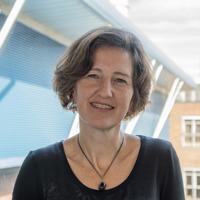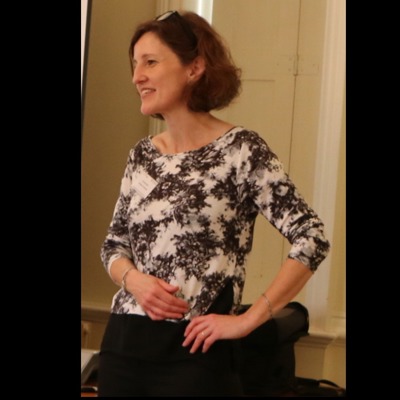
Alice Moncaster
Senior Lecturer in Engineering at Open University
I think four things are particularly important. Firstly, believe that you can do it. Tell yourself repeatedly how good/capable you are, because other people probably won’t. Secondly, don't underestimate the power of subconscious (and sometimes conscious) bias of those around you, which still has the effect of pushing women into more administrative and less independent and exciting roles (even within engineering or science) if you don’t fight it. Thirdly, develop a strong and supportive network of women both within and outside work. Finally, if you want children and a fulfilling career, your partner needs to understand and support this as much as you. She/he needs to be taking as much time off work and limiting his/her career in the early days as you. Children are wonderful but they are a whole additional job in themselves and both parents will need to make equal sacrifices in their individual careers. I do have friends who are working single mothers in academia too, which is hugely impressive but incredibly difficult!
About Alice...
Who am I?
"My top two personality types were Explorer and Communicator, which is just about right! I love finding out new things and working out what I want to study and explore next. But I also love communicating: writing about my research is often when I gain most insights, so I'm not just telling other people about it, I'm also developing my own ideas through communication."
What do I do?
"I do academic research into areas I think are important and interesting. My area is sustainability in the built environment and at the moment I'm interested in how decisions are made within design teams: what encourages people to design more sustainable buildings?, what are the (calculated, numeric) impacts of those decisions? and what are the hidden influences which affect their decisions? I write academic papers about what I find. I particularly love this as I enjoy clear writing and developing strong arguments to demonstrate my case. I also write teaching materials for engineering undergraduates - I like explaining things clearly but making them interesting at the same time, and it's also extremely important to teach future engineers about sustainability.I am a supervisor for several PhD students, and I enjoy inspiring them to develop their own thoughts and ideas to come up with new insights. I love most of all the opportunity to think either as deeply as I want, or as widely as I want, about any particular problem. It feels like being an athlete, stretching myself to the utmost, only the muscle I'm stretching is my brain. It is competitive and hard work. I moved into academia in my mid-thirties, after working in industry as a buildings design Engineer. Ten years later I am now a Senior Lecturer and hope to be a Professor in the future. I earn about £55k, which is a good salary for a job which I love and which has so much flexibility."
How did I get here?
"I was encouraged to go into engineering by my Physics teacher at school. My parents were in completely different areas - my Dad was a lawyer and my Mum a publisher, so I didn't get my ability in Physics and Maths from them. I enjoyed my time in industry, designing buildings as part of a team of architects and engineers, but I really wanted to do something more individual and exploratory, find out the answers to deeper questions that I had. However it was after I had gone through a difficult time at home that I actually stopped and got off the track that I had been on and it gave me the chance to rethink what I wanted to do with my life. The difficult time wasn't work-related - it was because my husband was very ill for a couple of years while our children were tiny and I was having to work to support us all while looking after my girls and husband. When he got on the right drugs and got back to work, I decided to take some time off, really to begin with just to be able to recover and make up for some of the time I had lost out on with my children, by then 3 and 7. But the opportunity to rethink made me realise that I wanted to do a PhD in order to look back into the construction industry from the outside and reflect on how it might become more sustainable. I managed to find some funding for the PhD, and as soon as I had started that I was also offered a research job at a different university ... and I have never looked back. I just loved it, right from the start."
The life I live
"I enjoy reading, gardening, cooking, walking my dog and socialising with my family and friends."
My typical day
"A typical day is hard to describe as every day is different. But the past week has included: being interviewed (through Skype) by the Building Research Association of New Zealand about how to move their construction industry to zero carbon by 2050; a 2 hour supervision (long one-to-one lesson) with a PhD student to help her finalise her thesis on decisions about demolishing or refurbishing buildings; writing a book chapter on ‘circular economy for the built environment’ for 'The Handbook of Circular Economy', with colleagues in Scandinavia; and working with two colleagues developing a new group work activity for an engineering course, in which small groups of students will design a low-carbon heating and ventilation system for different building types and geographic locations."
My qualifications
"Secondary education (GCSE/O-Levels)Post secondary education (College, A-levels, NVQ3 or equivalent) A levels - 1989 Maths, Physics, Further Maths, English Undergraduate degree (BSc, BA, etc.) Engineering Bachelors (Cambridge, 1993) Post-graduate degree (MSc, MA, etc.) Masters (Bristol, 1997)Doctorate (PhD) PhD (University of East Anglia, 2013)Chartered Engineer, and Member of the Institution of Civil Engineers, 2005"
Alice's Photos




